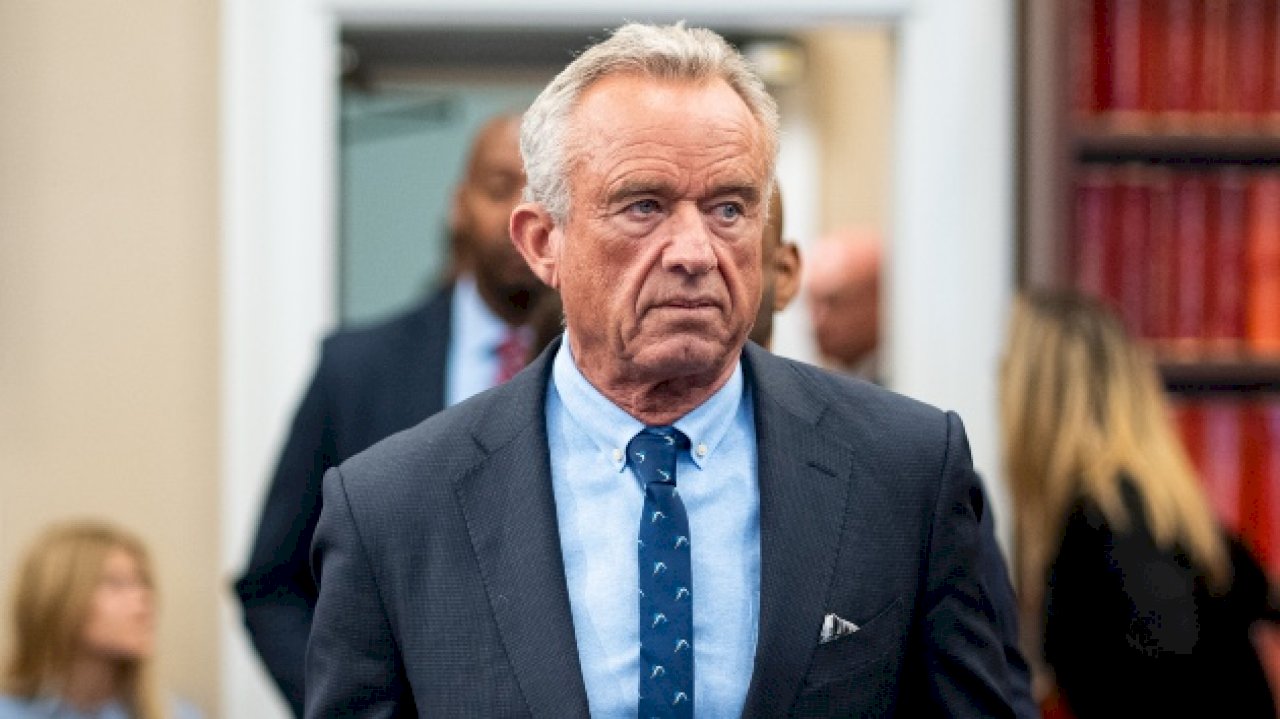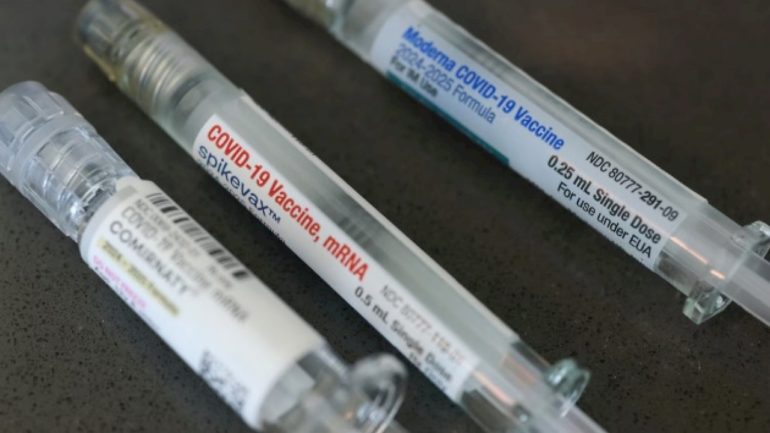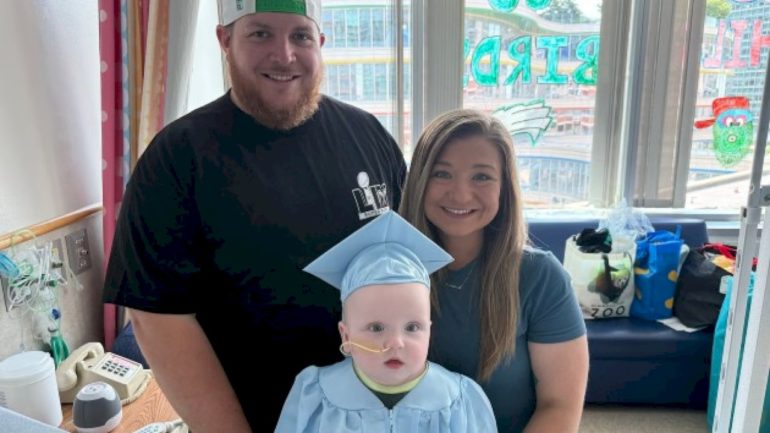Listeners:
Top listeners:
-
 play_arrow
play_arrow
94.3 Rev-FM The Rock of Texas | Where Texas Rocks
-
 play_arrow
play_arrow
99.1 The Buck Texas Country's Number 1 Country
-
 play_arrow
play_arrow
103.7 MikeFM Your Texas Hill Country Mix Tape
-
 play_arrow
play_arrow
KERV 1230 AM
-
 play_arrow
play_arrow
JAM Sports 1 JAM Broadcasting Sports 1
-
 play_arrow
play_arrow
JAM Sports 2 JAM Broadcasting Sports 2
RFK Jr. says people should not take medical advice from him, defends HHS cuts during House hearing

(WASHINGTON) — Health and Human Services Secretary Robert F. Kennedy Jr., one of the nation’s most publicly recognized vaccine skeptics, took a softened approach on vaccines when he answered questions before a House committee Wednesday morning, avoiding sharing his personal views and instead deferring to the doctors running the National Institutes of Health and Centers for Disease Control and Prevention.
Kennedy also defended the massive cuts to the department’s workforce and laid out his priorities for the Trump administration’s proposed budget.
After he appeared before the House Appropriations Committee Wednesday morning, he will head to the Senate Health, Education, Labor, and Pensions (HELP) Committee in the afternoon. The appearances mark the first time Kennedy has testified before Congress since his confirmation hearings in late January, and force him to confront statements he made that critics say are evidence of promises broken.
Kennedy says his ‘opinions about vaccines are irrelevant’
During the House hearing, Kennedy avoided sharing his own thoughts about vaccines — which have previously invited skepticism.
Asked by Democratic Rep. Mark Pocan if he would today vaccinate his own children for measles and chickenpox, Kennedy said “probably” for measles, but that “what I would say is my opinions about vaccines are irrelevant.”
“I don’t want to seem like I’m being evasive, but I don’t think people should be taking advice, medical advice from me,” Kennedy said.
He said he has directed NIH Director Jay Bhattacharya to try to “lay out the pros and cons, the risks and benefits, accurately as we understand them, with replicable studies,” for people to “make that decision.”
His comments mark a departure from his strong opinions about vaccines before taking office as HHS secretary.
During his confirmation hearing in January, Kennedy said that he supports vaccines, although he refused to unequivocally say that vaccines don’t cause autism, despite numerous existing studies already showing there is no link. However, in March, the HHS confirmed that the CDC will study whether vaccines cause autism.
Shortly after Kennedy said people should not take his medical advice, some public health experts criticized the comments — one of whom said that giving people guidance “is [Kennedy’s] job.”
“The problem is that is his job — the top line of his job description — is the nation’s chief health strategist. That is the top line of every health official, federal, state, local leader. That is his job, is to give people the best advice that he can. I believe that he’s giving up on, in my view, his chief responsibility,” Georges Benjamin, executive director of the American Public Health Association, told reporters on a call in which he and other health leaders responded to Kennedy’s testimony in front of the House Appropriations Committee.
Benjamin pointed out that Kennedy has, in fact, seemed to advise people on how to treat measles, leading them toward unproven remedies.
‘Because of these cuts people will die’
Kennedy continued to maintain that widespread cuts at HHS have not impacted key health programs, saying he has not withheld any funding for lifesaving research at NIH and continues to prioritize pillars such as Head Start, Medicare and Medicaid.
But in a tense back-and-forth with Democratic Rep. Rosa DeLauro, ranking Member of the House Appropriations Committee, she demanded Kennedy’s assurance that he would not cut programs that have been approved and funded by Congress, which has “the power of the purse” ascribed to it in the Constitution.
Kennedy said he would spend appropriated money — which drew repeated exasperation from DeLauro, who pointed to $20 billion in cuts to NIH.
In April, HHS began laying off about 10,000 workers and consolidating 28 institutes and centers into 15 new divisions.
Including the roughly 10,000 people who have left over the last few months through early retirement or deferred resignation programs, the overall staff at HHS is expected to fall from 82,000 to around 62,000 — or about a quarter of its workforce.
Kennedy said his goal at HHS is to focus on the chronic disease epidemic and deliver effective services for those who rely on Medicare, Medicaid and other services by cutting costs to taxpayers.
“We intend to do more, a lot more with less. The budget I’m presenting today supports these goals and reflects two enduring American values, compassion and responsibility,” Kennedy said in his opening statement.
DeLauro slammed Kennedy and the Trump’s administration for the cuts to HHS, including the elimination of entire divisions.
“Mr. Secretary, you are gutting the life-saving work of the Department of Health and Human Services and its key agencies while the Republicans in this Congress say and do nothing,” DeLauro said. “Because of these cuts people will die.”
DeLauro also finished the hearing with an impassioned plea for Kennedy to stop cutting programs, telling him he does not have the authority to go against what Congress allocated in the budget.
“You do not have the authority to do what you are doing,” she said.
Kennedy defends measles outbreak response
Kennedy rebuked criticism of his agency’s response to the measles outbreak.
“We are doing a better job at CDC today than any nation in the world controlling this measles outbreak,” Kennedy said.
DeLauro hit back, saying that Kennedy’s comparison of the U.S. response to measles to the response of other countries was unfair.
“Mr. Secretary, you keep comparing the U.S. to other countries, compare us to Europe, but the Europe you are referring to is the WHO European region has 53 countries in Europe and in Asia, including those with low vaccine vaccination rates like Romania and that has never eliminated measles,” she said. “If you compare us to western Europe countries that we often compare ourselves to, like Great Britain, they have seen no measles death.”
Kennedy argued that the U.S. is doing better than other countries in the Americas with smaller populations, including Canada and Mexico.
DeLauro scolded Kennedy for promoting vaccine skepticism in the wake of a measles outbreak spreading across the U.S.
In the wake of several ongoing measles outbreaks across the U.S. and over 1,000 cases so far this year, Kennedy has shared contradicting views about vaccines.
In a post on X on April 6, Kennedy said that the “most effective way to prevent the spread of measles” is to receive the measles, mumps, rubella (MMR) vaccine. However, in a post later that evening, he said more than 300 children have been treated with an antibiotic and a steroid, neither of which are recognized treatments or cures for measles.
Dentist questions Kennedy’s fluoride comments
Kennedy’s controversial moves on fluoride came up with Republican Rep. Mike Simpson, a dentist, telling Kennedy he was concerned about the secretary’s comments on it.
Last month, Kennedy said he plans to assemble a task force and ultimately change the CDC’s guidance to stop recommending adding fluoride to drinking water and other products. He has claimed that fluoride in drinking water affects children’s neurological development.
The Food and Drug Administration said it will conduct a scientific review of fluoride-containing supplements sometimes used to strengthen children’s teeth by late October with the aim of removing them from the market.
“I’ve seen the benefits having been a practicing dentist for 22 years. … You don’t prevent cavities by fluoride killing the bacteria in the mouth,” Simpson said. “What it does is make the enamel more resistant to decay. So, I want to see the studies on this and where we’re headed with this.”
Previous reviews by public health experts and dental professionals have not shown any serious health risks with the addition of fluoride.
ABC News’ Sarah Beth Hensley and Anne Flaherty contributed to this report.
Copyright © 2025, ABC Audio. All rights reserved.
Written by: ABC News
Similar posts
-
Top popular

Ingram man charged with murder after fatal shooting

Kerr Crime Stoppers offering reward up to $5,000 for information in last week’s non-viable school threat

KISD asks parents to communicate with children about words and actions after ‘copy cat’ threat note found at middle school

City of Kerrville Parks and Recreation reminds citizens that a Red Flag Warning is in effect until further notice

City of Kerrville says that May 7 General and Special Elections will proceed



